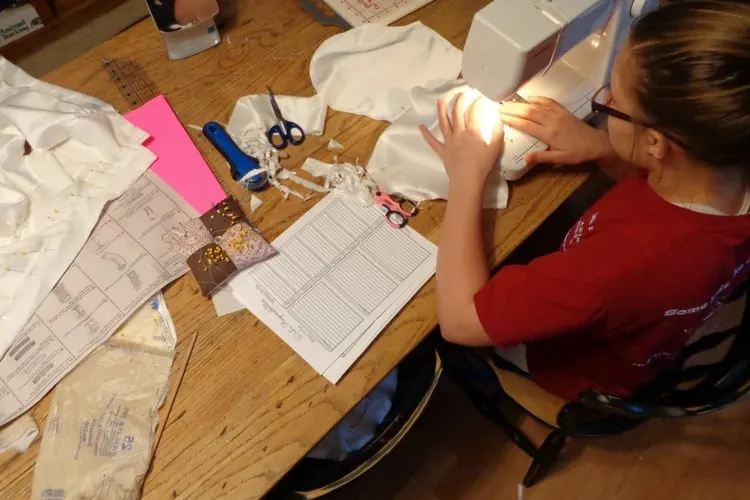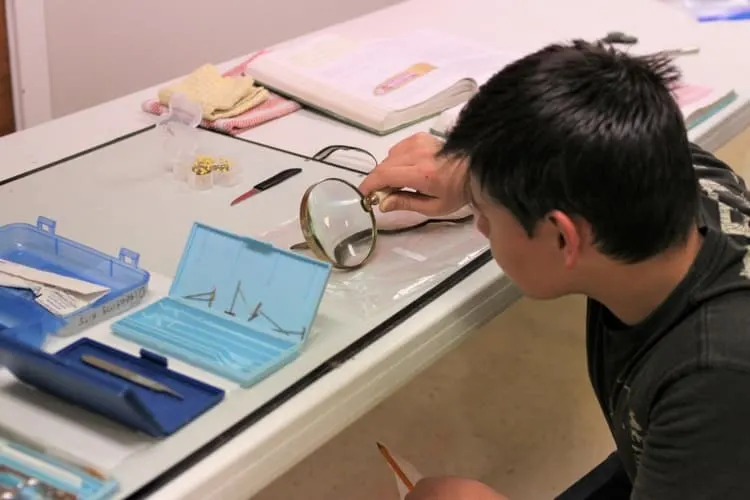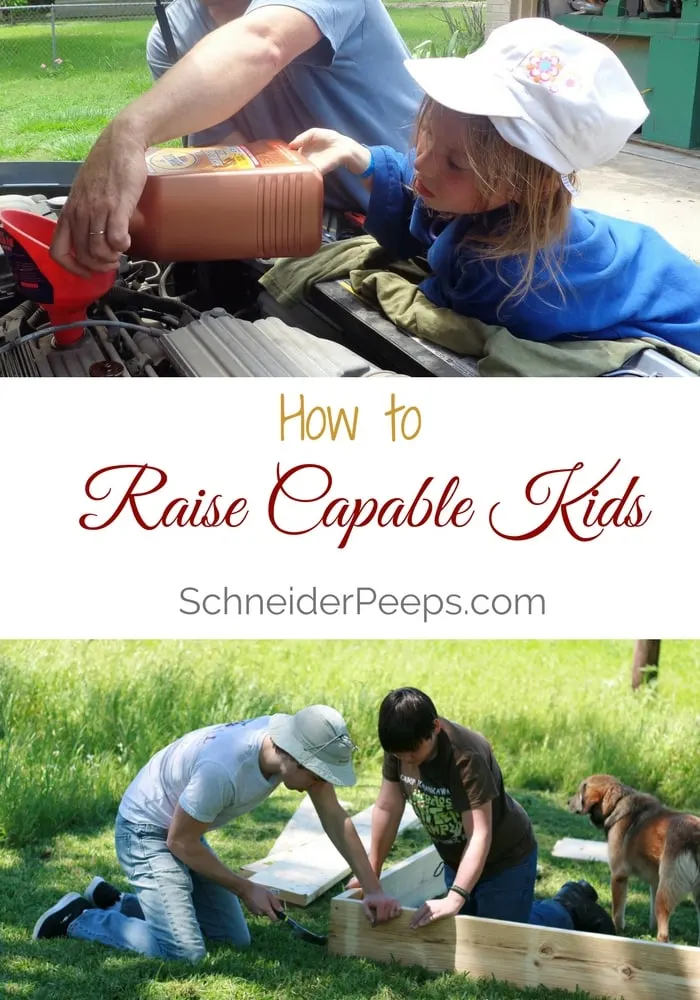Parenting is a journey that never ends, however, you only have about 18 years to truly set your children up to succeed as a an adult. The earlier you start, the smoother it will go. Before you know it, you will have raised self-reliant children who are capable of taking care of themselves, their family, and their community.

“You know, like nunchuck skills, bo hunting skills, computer hacking skills. Girls only like guys who have great skills.” This is my favorite quote from the movie Napoleon Dynamite. We often quote it when we’re teaching our children a new skill – of course, we change it a little for our girls.
Learning new skills can be challenging but is so important if raising capable children is a your goal.
I don’t write about parenting very often, mainly because I truly feel that parenting is a journey not a one-size-fits-all cloak. I don’t believe there is a checklist and if we just check each of those boxes, we’re good.
Parenting is so much more complicated than that! Parenting has broken me and grown me more as a person than anything I’ve ever done.
Our fourth child will be graduating this year and I’m finally feeling like I have a handle on this parenting gig. Please know that we’ve made plenty of mistakes and done a few things right.
The things I’m sharing are things we’ve learned from mistakes and successes. As parents we’ve had two main goals for our children….to walk with the Lord and to be productive members of society.
There are so many skills that your child can be taught by just being by your side and helping you. When they’re little their help isn’t always so helpful but we’ve found that when they’re young that’s when they’re most excited to help.
If we shoo them away when they’re little it will be hard to get them back when they’re big. My husband and I call this “parenting by hanging out together.”

Teaching Kids to Cook
Everyone needs to know how to cook, and I don’t mean opening a can of Denty Moore® and heating it up in the microwave. But I also don’t mean knowing how to cook gourmet meals.
All of our kids can cook at some level, some are more adventurous than others. The goal isn’t that every kid learn to cook every meal you know how to cook, the goal is that every kid leave home being comfortable in the kitchen and able to cook for himself.
This includes knowing how to use knives properly. We start our children cutting soft fruits and vegetables very early, a three year old can easily cut bananas and avocados with a butter knife.
When my big kids were little I invested in three kid’s knives from Pampered Chef, we have one left for the grandkids. Pampered Chef no longer makes this knife which is a shame but I found one on Amazon which is similar. Our small children knew that anytime they wanted to cut something – fruit, bread, whatever – they could go to the draw and get “their” knife to use.
Guests would often raise their eyebrows at this but it was a great way to foster independence and self confidence in our young children.
I truly believe this can all be taught in a very natural way but just letting your kids be a part of what you’re doing, but if you feel like you need some guidance in this area Kitchen Stewardship has a great kids cooking and knife using course.

Teaching Kids to Use Tools
We’re a big fan of letting kids use real tools instead of plastic kid tools. We never want our children to confuse tools as toys so we always passed on the plastic Little Tyke’s type play sets. We did the same with kitchen stuff. If my children wanted to pretend to cook they used some pots, bowls, and spoons from the kitchen.
When our kids were about 4 or 5 we give them their first toolbox with things like a measuring tape, pliers, small hammer and a couple of screw drivers. By this time they know these are things that are used to build or repair things, not to just go around banging on furniture or walls. At first they only get to use the tools with supervision and eventually they can use them as they need without asking.
By the time our kids are about 8-10 they are using some power tools, things like hand sanders, a dremmel, and a drill press are fairly easy to control and help them gain the confidence they need to eventually use hand drills and saws. We still supervise until they are well into their teen years.
I don’t think everyone needs to know how to use all of these tools but I do think it’s important that everyone knows how to do basic home repairs and comfortable enough to learn new things as needed.

Teaching Basic Home and Car Maintenance
I heard about this survey on the news that stated that 1 in 5 adults in the UK don’t know how to change a light bulb. I get that people are busy and that light bulbs last longer than they used to… but really?
It caused me to ask all my kids if they know how to change a light bulb, everyone did – even Esther who is 8 and has never actually changed a light bulb.
By the time our children leave our home we want them to be able to not only change a light bulb, but to know how to do things like unclog a sink, fix a running toilet, mow and edge the lawn and trim trees, among other things.
Daily or weekly maintenance such as making a bed, cleaning the bathroom, cleaning the floors, and washing dishes are not only things they need to learn for themselves but also to be a good roommate to others.
It’s also important that they know how to do laundry including how to get stains out of clothes, how to sew on a button and do basic mending.
And don’t wait until they are about to leave for college to teach them, start early…like in elementary or middle school. By the time they’re in high school they can be totally responsible for their own clothes.
Although we have road side assistance on our auto polices, we still require all of our children to learn how to change a tire and change the oil in a car before they can get their license (even our girls).
These are just the very basic car maintenance and things that will come in handy over time.

Teaching Kids to be Financially Responsible
In order for kids to learn to be financially responsible they have to understand the value of money, that is that you get money when you work. There are many ways of teaching this, some families pay a commission for chores, some families give an allowance, some families do neither. Each family has to decide on what is best for their family based on their views and financial situation.
Learning to be content is an often overlooked part of teaching financial responsibility. We live in a time where there are new products coming to market very rapidly. It seems that as soon as the newest model of the iPhone is available people are talking about great the next generation will be. It’s really crazy and we can get caught up in thinking we always need to newest because that’s the best.
When the reality is that the “best” is the one that will do what you need it to do (probably just talk, text, take photos) and is probably what you already have. It’s not just phones, I’ve seen my kids do the same thing with Legos, Polly Pockets, Beanie Babies – there’s always going to be something new and we can’t always be chasing it or we’ll end up broke.
Children need to learn to save their money. When our children are young, we require them to save a percentage of all the money they get. It’s interesting that as they have gotten older all of them have increased that percentage to where they save more than they spend.
Obviously, when they get out on their own and paying for all of their own living expenses that changes but all of our adult children are still savers.
Children need to learn to give generously – but also learn how to evaluate where the money is going. It’s good for children to see you giving based on your convictions and to be a part of that.
Giving doesn’t always have to be big or through an organization, it could be making a meal for someone whose sick, or mowing a elderly neighbor’s lawn, or giving a Sonic gift card to a homeless person, or packing a shoe box for Operation Christmas Child – the possibilities are endless.
The idea is that children need to learn that it’s not all about them.
I truly believe that if children know how to do these things they’ll be just fine as adults. Because they’re content they won’t go into debt. Because they save money they’ll have money for the truly important things and again avoid debt. Because they know money is a trade for working, they’ll be hard workers and excellent employees or business owners.
Of course, they need to also know how to manage a checking and savings account and how to write a check because sometimes you need a check and not a debit card.

Letting Kids Fail
It’s okay if kids fail, we all fail at times! I truly believe that self confidence doesn’t come from always doing everything right, it comes from trying and sometimes failing and trying again and eventually succeeding. Somehow this generation (my generation) of parents has forgotten that.
It’s important that kids struggle and try to figure things out for themselves, so don’t be too quick to rush in and save the day – but certainly give guidance and encouragement when asked for help, but don’t do it for them.
It’s hard watching my children fail but there are lessons they learn from failing and if I rush in to rescue them I’m just delaying the lessons they need to learn.
Many schools have all their assignments online so parents can check to see if their child has homework or didn’t turn something in and it’s easy to get into the cycle of checking up on them. I’ve heard from more than one parent that their child doesn’t listen to homework assignments in class because he knows Mom will just tell him when he gets home what he needs to do. This isn’t going to work so well once the child get to college.
Homeschool is different but yet the same. One of my son’s turned a paper in many weeks late for a class he was taking at our co-op. When the teacher told me she asked how she should grade it, I said “He deserves a big fat zero.” She didn’t agree so I said, “I’d prefer he not get a passing grade on this.” And truly that’s what I wanted. He needed to know that a late paper is unacceptable in the real world and turing in late work had become a habit for him.
Unfortunately, she gave him 70 on the paper and then he made an A in the class. When I saw his final grade I asked him how he felt about that A. He said he didn’t deserve it because he should have gotten a zero on the paper. He knew.
And that’s the point, kids know if they’ve been rescued and although they may feel good for a moment in the end they feel incapable – why else would they need mom, dad, or teacher to step in an rescue them.
I’m not saying a parent should never help a child out, for instance if he forgot his lunch, or gym bag, or even a school assignment, it’s okay to take it to him. However, if this forgetfulness is a habit and not an odd occurrence, then you need to figure out how to help your child be more responsible.
Conclusion
For the most part you have about 18 years to train your child to be a fully functioning adult. If you’re child is young then you can leisurely teach these skills as the child grows. If you child is already a teen, you have less time but you don’t need to stress out about it, just start with one thing and when your child is comfortable with that thing, move on to another. You may have less time, but your child is older and will catch on sooner. Just remember that raising capable children is a journey not a sprint.
What tips do you have for raising capable children?


Helena
Wednesday 8th of November 2017
I've come back to this post a couple of times now, and find myself pondering it often. Thank you for sharing!
Angi Schneider
Thursday 9th of November 2017
Thank you, Helena. There is much to ponder about parenting...lol.
Wendy
Sunday 15th of October 2017
This really is a great post and so true. I have to make a better effort :-) (for them).
Wendy
Angi Schneider
Monday 16th of October 2017
Wendy, we all have those times when we realize we're off the mark just a bit and need to back on track. That's all part of the journey of life.
Maria
Saturday 14th of October 2017
Thank you for this wonderful post!! There's so much to say about what skills our children need. You listed some very important. I would like to ad that in our ever changing world I want my children to be aware of different ways of getting information, and that those ways most likely will change on a regular basis. Thanks again for a great post!
Angi Schneider
Sunday 15th of October 2017
That's a great point, Maria. I can't believe how much technology has exploded these last 10-15 years and I'm sure it will only continue to explode.